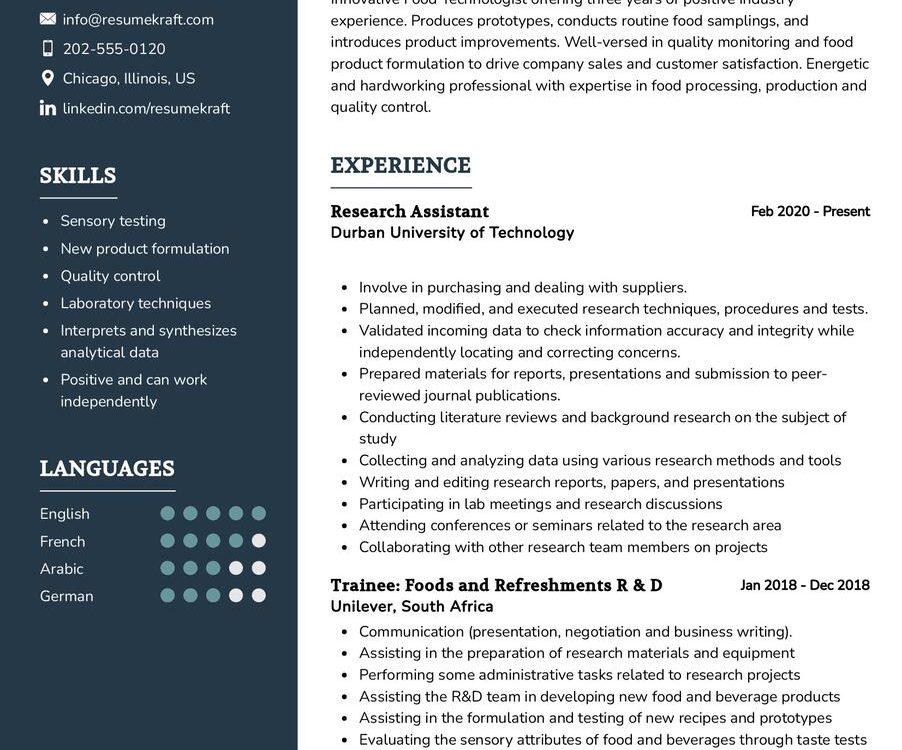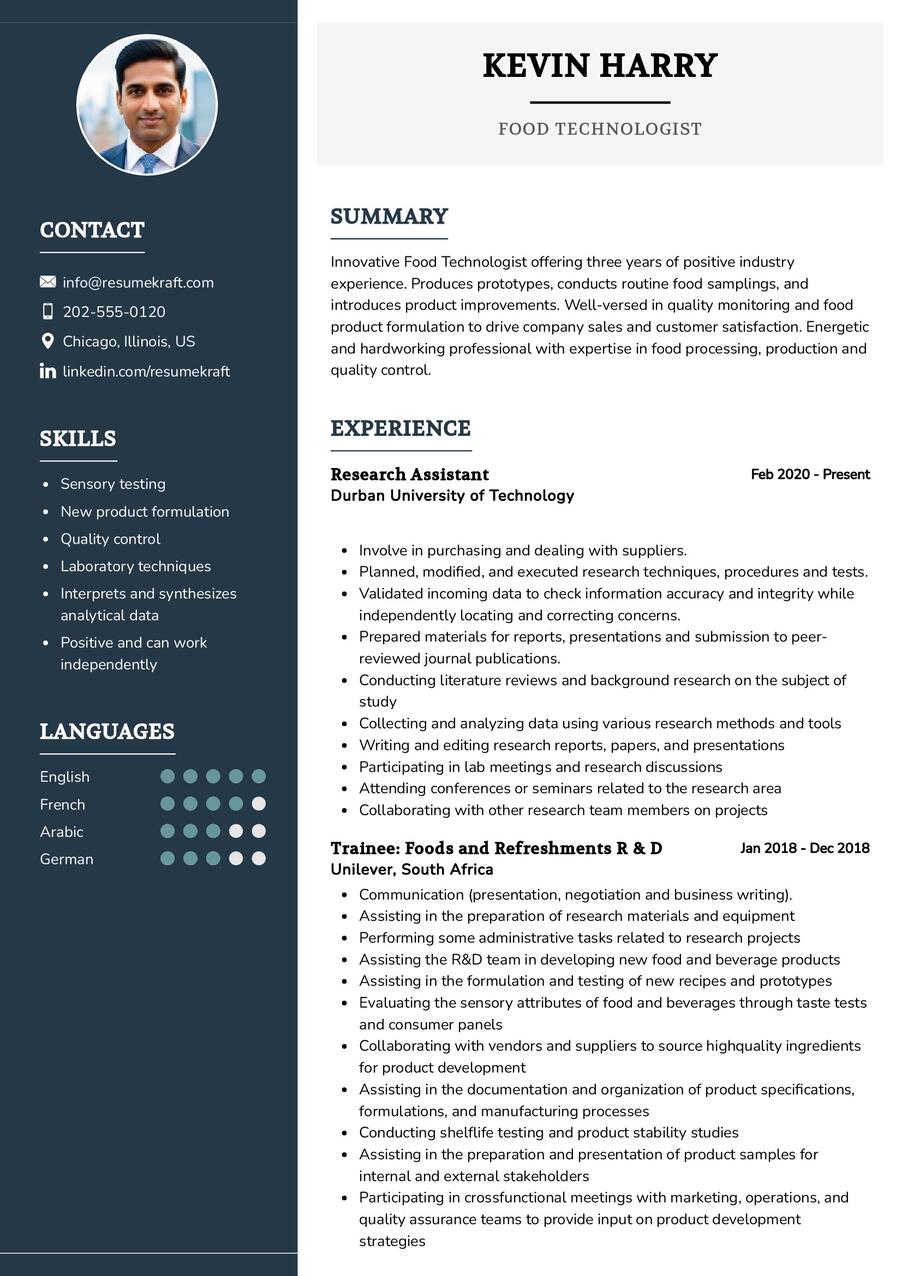Exploring the Role of a Food Technologist
In today’s dynamic food industry, the role of a Food Technologist is crucial in ensuring the safety, quality, and innovation of food products. This article delves into the multifaceted responsibilities and requirements of a Food Technologist, a position that demands a unique blend of scientific knowledge and practical application.
What are the Food Technologist Job Requirements?
Becoming a Food Technologist involves meeting specific requirements and acquiring a diverse skill set. Here’s a detailed look at the prerequisites for stepping into this impactful role:
- A Bachelor’s or Master’s degree in Food Science, Food Technology, or a related field, showcasing a solid foundation in the scientific domain.
- Comprehensive knowledge of food processing, preservation, and safety regulations.
- Hands-on experience in food product development, demonstrating a trajectory of increasing responsibility in the field.
- Strong analytical and problem-solving skills, honed through practical experiences and possibly through relevant courses and certifications.
- Proficiency in laboratory techniques, quality control, and regulatory compliance.
- Excellent communication skills to collaborate effectively with cross-functional teams.
- Adaptability to keep pace with evolving food trends and technologies.
Obtaining additional certifications in Food Safety, Quality Management, or related fields can enhance your profile in the competitive job market.
Responsibilities of a Food Technologist
The role of a Food Technologist encompasses a wide array of responsibilities, each contributing to the overall quality and safety of food products. Let’s delve into the core responsibilities that define this role:
- Conducting research to develop new food products or improve existing ones, considering factors like taste, nutritional value, and marketability.
- Collaborating with food scientists, engineers, and marketing professionals to bring innovative ideas to fruition.
- Performing quality control checks on raw materials and finished products to ensure compliance with industry standards and regulations.
- Analyzing the nutritional content of food products and implementing changes to enhance their health benefits.
- Keeping abreast of food industry trends, regulatory changes, and technological advancements to make informed decisions.
- Creating and maintaining detailed records of experiments, processes, and results for future reference.
- Providing technical support to production teams and addressing any issues related to food quality or safety.
Each responsibility adds a layer to your expertise, shaping you into a proficient Food Technologist.
Food Technologist CV Writing Tips
Your CV is a crucial tool in presenting your qualifications and experiences effectively. Here are some tips to craft a standout Food Technologist CV:
- Highlight your educational background, emphasizing relevant coursework and research projects.
- Showcase your hands-on experience in food product development, detailing successful projects and improvements made.
- Quantify your achievements where possible, using metrics to illustrate the impact of your work on product quality or efficiency.
- List any certifications or additional training you’ve acquired in the food industry.
- Customize your CV for each application, aligning it with the specific requirements of the job.
Your CV is not just a document; it is a representation of your skills and accomplishments in the field of Food Technology.
Food Technologist CV Summary Examples
Your CV summary is the opening statement of your career story, setting the stage for what follows. Here are some examples to inspire you:
- “Dedicated Food Technologist with a Master’s degree in Food Science, offering expertise in product development and quality control. Proven track record of enhancing nutritional profiles and ensuring compliance with industry standards.”
- “Experienced Food Technologist with a passion for innovation and a history of successful collaboration with cross-functional teams. Skilled in analyzing and improving food product quality.”
- “Results-driven Food Technologist with hands-on experience in the creation and enhancement of food products. Committed to staying abreast of industry trends and implementing best practices in food technology.”
Each summary provides a glimpse of your journey, your strengths, and your vision as a Food Technologist.
Building Your Food Technologist CV Experience Section
Your experience section is the heart of your CV, narrating the story of your career progression and achievements. Here are examples to guide you:
- “Led a team in developing a new line of organic snacks, contributing to a 15% increase in product sales within six months.”
- “Implemented a streamlined quality control process, resulting in a 20% reduction in product defects and enhanced overall product quality.”
- “Collaborated with marketing teams to launch a successful line of gluten-free products, catering to a growing market demand.”
Each experience is a chapter in your career book, showcasing your ability to drive positive outcomes.
Education Section for Your Food Technologist CV
Your educational journey forms the foundation of your expertise. Here’s how to present it in your CV:
- Master of Science in Food Science, XYZ University, a comprehensive program specializing in advanced food technology concepts, 2017.
- Bachelor of Science in Food Technology, ABC University, providing a solid foundation in food science and technology, 2015.
- Certified Food Safety Professional, demonstrating expertise in ensuring food safety and compliance, 2018.
Each educational qualification is a stepping stone, leading you to success in your Food Technologist career.
Essential Skills for Your Food Technologist CV
Your skill set is a toolkit equipped with a range of abilities crucial to your role as a Food Technologist. Let’s outline the essential soft and hard skills:
Soft Skills:
- Collaboration and teamwork, the ability to work effectively with diverse teams in a laboratory or production setting.
- Communication skills, both written and verbal, to convey technical information clearly.
- Analytical thinking, the ability to assess data and make informed decisions.
- Attention to detail, ensuring precision in experiments and quality control processes.
- Adaptability, the capacity to embrace new technologies and methodologies in the ever-evolving food industry.
Hard Skills:
- Proficiency in laboratory techniques, including food testing and analysis.
- Knowledge of food safety regulations, ensuring compliance in all stages of food production.
- Experience in food product development, from conceptualization to market launch.
- Quality control skills, identifying and rectifying issues to maintain product standards.
- Understanding of food chemistry and microbiology, vital for ensuring product safety.
Each skill is a tool, aiding you in providing safe, high-quality food products and leading your team effectively.
Common Mistakes to Avoid in Your Food Technologist CV
As you craft your CV, steer clear of common pitfalls that can hinder your chances of securing your dream job. Here are some mistakes to avoid:
- Avoid using a generic CV for all applications; tailor your CV to highlight the most relevant experiences and skills for each position.
- Avoid listing job duties without emphasizing your achievements, providing depth to your narrative.
- Don’t overlook the importance of a cover letter; use it as an opportunity to convey your passion for food technology and connect with potential employers.
- Avoid excessive use of technical jargon; ensure your CV is accessible to a broad audience.
- Proofread your CV thoroughly to maintain a professional image.
Each mistake can impact your professional image; avoid them to craft a compelling and authentic CV.
Key Takeaways for Your Food Technologist CV
As we conclude this comprehensive guide, let’s recap the key points to keep in mind while crafting your Food Technologist CV:
- Highlight your educational background and relevant coursework.
- Showcase your hands-on experience in food product development and quality control.
- Quantify your achievements where possible, using metrics to illustrate your impact.
- List any certifications or additional training in the food industry.
Finally, feel free to utilize resources like AI CV Builder, CV Design, CV Samples, CV Examples, CV Skills, CV Help, CV Synonyms, and Job Responsibilities to create a standout application and prepare for the Food Technologist job interview.


